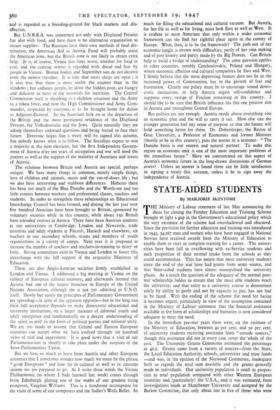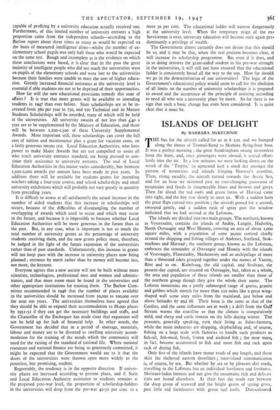STATE-AIDED STUDENTS
By MARJORIE McINTOSH
THE Ministry of Labour statement of last May announcing the dates for closing the Further Education and Training Scheme brought tb light a gap in the Government's educational policy which the very existence of the scheme had overshadowed and obscured. Since the provision for further education and training was introduced in 5943, 34,167 men and women who have been engaged in National Service have received awards from the Ministry of Education to enable them to start or complete training for a career. The univer- sities have been full to overflowing with ex-Service students and such proportion of their normal intake from the schools as they could accommodate. This has meant that most university students since the end of the war have had grants from some sourcc, and that State-aided students have almost monopolised the university places. As a result the question of the adequacy of the normal post- war scholarship ladder to ensure that the most able students reach the university, and that• entry to a university course is determined solely by ability to profit and not by capacity to pay, has not had to be faced. With the ending of the scheme the need for facing it becomes urgent, particularly in view of the assumption contained in the Ministry of Labour statement that the financial assistance available in the form of scholarships and bursaries is now considered adequate to meet the need.
In the immediate pre-war years there were, on the estimate of the Ministry of Education, between 40 per cent. and 50 per cent. of university students receiving assistance from "outside sources," though this assistance did not in every case cover the whole of the cost. The University Grants Committee estimated the percentage as 41.2. Grants came from a variety of sources—from the State, the Local Education Authority, schools, universities and trust funds —and was, in the opinion of the Norwood Committee, inadequate both as regards the total sum available and the grants generally made to individuals. Our university population is small in propor- tion to total population compared with other Western European countries and (particularly) the U.S.A., and it was estimated, from investigations made at Manchester University and accepted by the Barlow Committee, that only about one in five of those who were capable of profiting by a university education actually received one. Furthermore, of this limited number of university entrants a high proportion came from the independent schools—according to the Barlow report about three times as many as would be expected on the basis of measured intelligence alone—whilst the number of ex- elementary school pupils was only half those who would be expected on the same test. Rough and incomplete as is the evidence on which these conclusions were based, it is clear that in the past the great majority of intelligent people who did not reach the universities were ex-pupils of the elementary schools and were lost to the universities because their families were unable to meet the cost of higher educa- tion. Greatly increased financial assistance at the university level is essential if able students are not to be deprived of their opportunities. How far will the new educational provisions remedy this state of affairs ? It is true that more grants will be available to intending
students in 1947 than ever before.' State scholarships are to be in- creased from 360 per year to 750, and too Technical and 20 Mature Students Scholaiships will be awarded, many of which will be held at the universities. All university awards of not less than £40 a year are to be supplemented by the Ministry of Education, and there will be between 1,200-1,500 of these University Supplemental Awards. More important still, these scholarships can cover the full cost of tuition and maintenance plus a grant for vacation costs, on a fairly generous means test. Local Education Authorities, who have power to make Major Awards but are not compelled to assist all who reach university entrance standard, are being pressed to con- tinue their assistance to university entrants. The zeal of Local Education Authorities in this matter varies considerably, but between 1,500-2,000 awards per annum have been made in past years. In addition there will be available for students grants for intending teachers taking a four-year course, and school scholarships and small university exhibitions which will probably not vary greatly in quantity from preceding years.
It is difficult to assess at all satisfactorily the actual increase in the number of aided students that this increase in scholarships will secure, because of the difficulties of disentangling the number of overlapping of awards which used to occur and which may occur in the future, and because it is impossible to forecast whether Local Education Authorities will be more generous in the future than in the past. But, in any case, what is important is not so much the total number of university grants as the percentage of university students receiving them, and the new grants policy must, therefore, be judged in the light of the future expansion of the universities rather than of past standards. Unfortunately, this increase in grants will not keep pace with the increase in university places now being planned ; entrance by merit rather than by money will become less, not more, the keynote.
Everyone agrees that a new society will not be built without more scientists, technologists, professional men and women and adminis- trators, and that more room must be found in the universities and other appropriate institutions for training them. The Barlow Com- mittee recommended in 1946 that the number of places available in the universities should be increased from 5o,000 to too,000 over the next ten years. The universities themselves have agreed that they should be able to expand their accommodation to 88,000 places by 1951-52 if they can get the necessary buildings and staffs, and the Chancellor of the Exchequer has made clear that expansion will not be held up for lack of financial help. In other words, the Government has decided that in a period of shortage, materials, labour and money are to be diverted to swelling university accom- modation for the training of the minds which the community will need for the raising of the standard of national life. Where national resources and national finance are being so generously committed, it might be expected that the Government would see to it that the doors of the universities were thrown open more widely to the penniless, but promising, student.
Regrettably, the tendency is in the opposite direction. If univer- sity places are increased according to present plans, and if State and Local Education Authority assistance to students remains at the proposed post-war level, the proportion of scholarship-holders in the universities will drop from the pre-war 40-50 per cent, to a mere 30 per cent. The educational ladder will narrow dangerously at the university level. When the temporary reign of the ex. Serviceman is over, university education will become once again pre- dominantly, a privilege of wealth.
The Government almost certainly does not desire that this should be so, and it may be that, when the real position becomes clear, it will increase its scholarship programme. But even if it does, and in so doing restores the grant-aided student to his pre-war strength in the universities, it will still not have ensured that the educational ladder is consistently broad all the way to the top. How far should we go in the democratisation of our universities? The logic of the Government's educational policy would seem to call for the abolition of all limits on the number of university scholarships it is prepared to award and the acceptance of the principle of assisting according to need all who win a university place by merit. So far there is no sign that such a basic change has even been considered. It is quite clear that it must be.



































 Previous page
Previous page